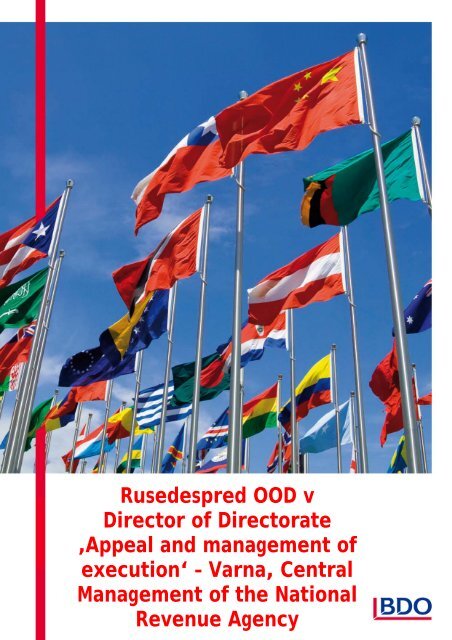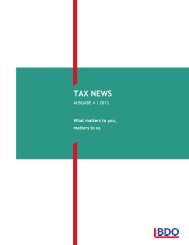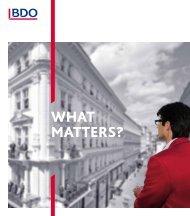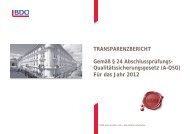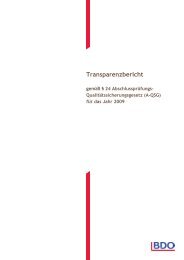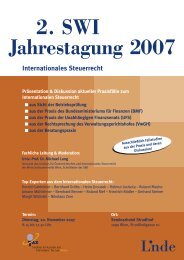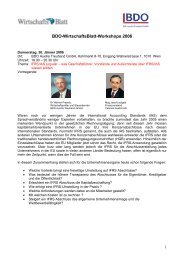Rusedespred OOD v Director of Directorate ‚Appeal and ...
Rusedespred OOD v Director of Directorate ‚Appeal and ...
Rusedespred OOD v Director of Directorate ‚Appeal and ...
You also want an ePaper? Increase the reach of your titles
YUMPU automatically turns print PDFs into web optimized ePapers that Google loves.
<strong>Rusedespred</strong> <strong>OOD</strong> v<br />
<strong>Director</strong> <strong>of</strong> <strong>Director</strong>ate<br />
<strong>‚Appeal</strong> <strong>and</strong> management <strong>of</strong><br />
execution‘ – Varna, Central<br />
Management <strong>of</strong> the National<br />
Revenue Agency
Particulars<br />
• Reference for a preliminary ruling from the Administrative court Varna (Bulgaria)<br />
made by decision <strong>of</strong> 6 March 2012.<br />
• Subject: Taxation – VAT – Directive 2006/112/EC – Article 203 – Principle <strong>of</strong> fiscal<br />
neutrality – Refund to the supplier <strong>of</strong> tax paid where the recipient under an exempt<br />
transaction is refused a right <strong>of</strong> deduction.<br />
Background<br />
<strong>Rusedespred</strong> had refurbished <strong>and</strong> sold a building to another company, Esi trade E<strong>OOD</strong> (Esi<br />
Trade), <strong>and</strong> exempted from the invoice the VAT on the sale <strong>of</strong> the building but not on any<br />
<strong>of</strong> the other costs. Upon an audit <strong>of</strong> Esi Trade, the tax authority stated that the entirety <strong>of</strong><br />
the invoice was exempted from VAT.<br />
Despite refusing the company the right to deduct the VAT incorrectly included in the<br />
invoice, the tax authority claimed that the VAT had been lawfully paid, <strong>and</strong> that it was the<br />
responsibility <strong>of</strong> the invoicing company <strong>Rusedespred</strong> to identify <strong>and</strong> correct the error.<br />
<strong>Rusedespred</strong> submitted an application for a refund <strong>of</strong> the amount improperly invoiced to<br />
the tax authority; the tax authority refused the refund sought on the ground that<br />
payments <strong>of</strong> VAT had not been wrongly made. <strong>Rusedespred</strong> brought proceedings before<br />
the Administrative Court, Varna claiming that in view <strong>of</strong> the fact that the tax authority<br />
had, by a final tax adjustment notice, earlier refused the recipient <strong>of</strong> the invoice the right<br />
to deduct the VAT paid though not due in respect <strong>of</strong> the exempt supply, the tax authority<br />
had wrongly refused to refund that tax.<br />
According to the regional directorate <strong>of</strong> the National Revenue Agency in Varna, where a<br />
taxable person takes the view that it has made an error when issuing an invoice, it is open<br />
to that person to correct that error in accordance with Article 116 <strong>of</strong> the VATA.<br />
So far as the possibility for <strong>Rusedespred</strong> to correct the incorrect invoice is concerned, the<br />
referring court states that, contrary to what the tax authority contends, that possibility<br />
was not available in the present case. The procedure for correction <strong>of</strong> incorrectly drawn<br />
up documents, governed by Article 116 <strong>of</strong> the VATA, requires the cancellation <strong>of</strong> the tax<br />
document so drawn up. Since the supply had already been the subject <strong>of</strong> a tax audit <strong>and</strong><br />
the customer under the supply had been refused deduction <strong>of</strong> the VAT entered on the<br />
invoice by a final tax adjustment notice, such an invoice cancellation would not have been<br />
permitted.<br />
Question referred<br />
Q1: Is a taxable person entitled, in accordance with the principle <strong>of</strong> the neutrality <strong>of</strong> VAT,<br />
within the limitation period laid down, to claim a refund <strong>of</strong> VAT wrongly invoiced <strong>and</strong> not<br />
due, where, under national law, the supply in respect <strong>of</strong> which the tax has been invoiced<br />
2
is exempt, the risk <strong>of</strong> loss <strong>of</strong> tax revenue has been removed <strong>and</strong> the system for the<br />
correction <strong>of</strong> invoices provided for under national law is inapplicable?<br />
Q2: Do the common system <strong>of</strong> VAT <strong>and</strong> the principles <strong>of</strong> neutrality, effectiveness <strong>and</strong><br />
equal treatment preclude the refusal by a revenue authority, on the basis <strong>of</strong> a provision <strong>of</strong><br />
national law transposing Article 203 <strong>of</strong> Directive 2006/112, to refund to a taxable person<br />
the VAT which that person has entered on an invoice where that tax is not due because<br />
the supply is exempt but was invoiced, accounted for <strong>and</strong> paid wrongly, <strong>and</strong> where the<br />
customer under the supply has already been refused, by a final tax adjustment notice, the<br />
right to deduct the input VAT in respect <strong>of</strong> the same supply on the ground that the VAT<br />
was invoiced improperly by the supplier?<br />
Q3: Can a taxable person rely directly on the principles governing the common system <strong>of</strong><br />
VAT <strong>and</strong>, more specifically, the principles <strong>of</strong> the neutrality <strong>of</strong> VAT <strong>and</strong> effectiveness, in<br />
order to contest a rule <strong>of</strong> national law or its application by the tax authorities <strong>and</strong> the<br />
courts, or the absence <strong>of</strong> such a rule, in breach <strong>of</strong> those principles?’<br />
Judgment <strong>of</strong> the Court<br />
The first <strong>and</strong> second questions<br />
It should be first noted that Article 203 <strong>of</strong> Directive 2006/112 provides that any person<br />
who enters VAT on an invoice is liable to pay the tax entered on the invoice.<br />
In providing that the VAT entered on an invoice is payable, Article 203 <strong>of</strong> Directive<br />
2006/112 seeks to eliminate the risk <strong>of</strong> loss <strong>of</strong> tax revenue which the right <strong>of</strong> deduction<br />
provided for in Article 167 et seq. <strong>of</strong> that directive might entail (see, to that effect,<br />
Stadeco, paragraph 28, <strong>and</strong> Stroy trans, paragraph 32). It is apparent from the order for<br />
reference that, since the tax authority had definitively refused the recipient <strong>of</strong> the invoice<br />
at issue the right <strong>of</strong> deduction, such a risk does not exist in the case in the main<br />
proceedings.<br />
Secondly, as regards the refund <strong>of</strong> VAT invoiced in error, it should be noted that Directive<br />
2006/112 does not contain any provisions relating to the adjustment, by the issuer <strong>of</strong> the<br />
invoice, <strong>of</strong> VAT that has been invoiced improperly <strong>and</strong> that, in those circumstances, it is in<br />
principle for the Member States to lay down the conditions in which improperly invoiced<br />
VAT may be adjusted.<br />
The Court has held that, in order to ensure the neutrality <strong>of</strong> VAT, it is for the Member<br />
States to provide, in their domestic legal systems, for the possibility <strong>of</strong> adjusting any tax<br />
improperly invoiced where the person who issued the invoice shows that he acted in good<br />
faith.<br />
However, where the issuer <strong>of</strong> the invoice has, in sufficient time, wholly eliminated the risk<br />
<strong>of</strong> any loss <strong>of</strong> tax revenue, the principle <strong>of</strong> the neutrality <strong>of</strong> VAT requires that VAT which<br />
has been improperly invoiced can be corrected without such adjustment being made<br />
3
conditional by the Member States upon the good faith <strong>of</strong> the issuer <strong>of</strong> the relevant invoice.<br />
The adjustment cannot be dependent upon the discretion <strong>of</strong> the tax authority.<br />
Thirdly, it should be borne in mind that the Member States may indeed adopt measures in<br />
order to ensure the correct levying <strong>and</strong> collection <strong>of</strong> the tax <strong>and</strong> for the prevention <strong>of</strong><br />
fraud. In particular, the condition that an incorrect invoice must be corrected before a<br />
refund <strong>of</strong> the VAT invoiced in error can be obtained can, in principle, ensure the<br />
elimination <strong>of</strong> the risk <strong>of</strong> loss <strong>of</strong> tax revenue.<br />
None the less, the measures must not go further than is necessary to attain the objectives<br />
thereby pursued <strong>and</strong> may not, therefore, be used in such a way that they would have the<br />
effect <strong>of</strong> undermining the neutrality <strong>of</strong> VAT, which is a fundamental principle <strong>of</strong> the<br />
common system <strong>of</strong> VAT established by the relevant European Union law.<br />
With regard to the case in the main proceedings, it is apparent from the order for<br />
reference that Bulgarian law provides, in principle, for the possibility <strong>of</strong> obtaining a refund<br />
<strong>of</strong> VAT invoiced in error, but makes the exercise <strong>of</strong> that right conditional on the prior<br />
correction <strong>of</strong> the incorrect invoice. As pointed out in this judgment, such a requirement<br />
can ensure the elimination <strong>of</strong> the risk <strong>of</strong> loss <strong>of</strong> tax revenue.<br />
However, it is also apparent from the order for reference that, pursuant to applicable<br />
national law, once the tax authority had definitively refused the recipient <strong>of</strong> the invoice<br />
the right to deduct the amount <strong>of</strong> VAT entered on it, the possibility <strong>of</strong> correcting the<br />
invoice at issue was no longer available to <strong>Rusedespred</strong>.<br />
Furthermore, as the referring court observes, since the tax authority had definitively<br />
refused the recipient <strong>of</strong> the invoice at issue the right <strong>of</strong> deduction, the risk <strong>of</strong> loss <strong>of</strong> tax<br />
linked to the exercise <strong>of</strong> the right was completely eliminated.<br />
In such circumstances, it must be held that making the adjustment <strong>of</strong> the VAT entered in<br />
error on an invoice subject to the condition that that invoice be corrected, a condition<br />
that is impossible to satisfy, goes further than is necessary to achieve the objective<br />
pursued by Article 203 <strong>of</strong> Directive 2006/112 <strong>of</strong> eliminating the risk <strong>of</strong> loss <strong>of</strong> tax revenue.<br />
The third question<br />
So far as concerns the possibility <strong>of</strong> relying on the principle <strong>of</strong> the neutrality <strong>of</strong> VAT<br />
against a Member State, it must be noted, first <strong>of</strong> all, that that principle is a fundamental<br />
principle <strong>of</strong> the common system <strong>of</strong> VAT as governed, inter alia, by Directive 2006/112.<br />
Secondly, the principle <strong>of</strong> the neutrality <strong>of</strong> VAT, as given specific definition by the caselaw<br />
relating to Article 203 <strong>of</strong> Directive 2006/112, must be interpreted as precluding a tax<br />
authority from refusing the supplier <strong>of</strong> an exempt supply the refund <strong>of</strong> VAT invoiced in<br />
error to a customer, on the ground that the supplier had not corrected the incorrect<br />
invoice, in circumstances where that authority had definitively refused the customer the<br />
right to deduct that VAT <strong>and</strong> such definitive refusal results in the system for correction<br />
provided for under national law no longer being applicable.<br />
4
According to case-law, the principle <strong>of</strong> the neutrality <strong>of</strong> VAT may, if necessary, be relied<br />
on by a taxable person against a provision <strong>of</strong> national law, or the application there<strong>of</strong>,<br />
which fails to have regard to that principle. In circumstances such as those set out in<br />
paragraph above <strong>of</strong> this judgment, since the principle <strong>of</strong> the neutrality <strong>of</strong> VAT, as given<br />
specific definition by the case-law relating to Article 203 <strong>of</strong> Directive 2006/112, places an<br />
unconditional <strong>and</strong> sufficiently precise obligation on the Member State concerned, it may<br />
be relied on against a provision <strong>of</strong> national law that fails to have regard to that principle.<br />
On those grounds, the Court hereby rules<br />
1. The principle <strong>of</strong> the neutrality <strong>of</strong> value added tax, as given specific definition by<br />
the case-law relating to Article 203 <strong>of</strong> Council Directive 2006/112/EC <strong>of</strong> 28<br />
November 2006 on the common system <strong>of</strong> value added tax, must be interpreted as<br />
precluding a tax authority from refusing, on the basis <strong>of</strong> a provision <strong>of</strong> national law<br />
intended to transpose that article, the supplier <strong>of</strong> an exempt supply the refund <strong>of</strong><br />
value added tax invoiced in error to a customer on the ground that the supplier<br />
had not corrected the erroneous invoice, in circumstances where that authority<br />
had definitively refused the customer the right to deduct that value added tax <strong>and</strong><br />
such definitive refusal results in the system for correction provided for under<br />
national law no longer being applicable;<br />
2. The principle <strong>of</strong> the neutrality <strong>of</strong> value added tax, as given specific definition by<br />
the case-law relating to Article 203 <strong>of</strong> Directive 2006/112, may be relied on by a<br />
taxable person in order to contest a provision <strong>of</strong> national law that makes the<br />
refund <strong>of</strong> value added tax invoiced in error conditional on the correction <strong>of</strong> the<br />
incorrect invoice, in circumstances where the right to deduct that value added tax<br />
has definitively been refused <strong>and</strong> such definitive refusal results in the system for<br />
correction provided for under national law no longer being applicable.<br />
Note<br />
This Bulgarian case concerned a situation where <strong>Rusedespred</strong> (the supplier) incorrectly<br />
invoices VAT on what was an exempt supply. The customer was refused input tax<br />
deduction. Whilst domestic legislation provides for the cancellation <strong>of</strong> invoices <strong>and</strong> reissue<br />
to correct errors this option, <strong>and</strong> a refund by the authorities <strong>of</strong> the VAT charged<br />
incorrectly, was no longer available to the <strong>Rusedespred</strong>, because the supply had been the<br />
subject <strong>of</strong> a tax audit <strong>and</strong> deduction had been refused. The ECJ unsurprisingly found such<br />
treatment is precluded under EU law.<br />
5
Disclaimer<br />
This publication has been carefully prepared, but it has been written in general terms <strong>and</strong><br />
should be seen as broad guidance only. The publication cannot be relied upon to cover<br />
specific situations <strong>and</strong> you should not act, or refrain from acting, upon the information<br />
contained herein without obtaining specific pr<strong>of</strong>essional advice. Please contact the<br />
appropriate BDO Member Firm to discuss these matters in the context <strong>of</strong> your particular<br />
circumstances. Neither the BDO network, nor the BDO Member Firms or their partners,<br />
employees nor agents accept or assume any liability or duty <strong>of</strong> care for any loss arising<br />
from any action taken or not taken by anyone in reliance on the information in this<br />
publication or for any decision based on it.<br />
Service provision within the international BDO network <strong>of</strong> independent member firms (‘the<br />
BDO network’) is coordinated by Brussels Worldwide Services BVBA, a limited-liability<br />
company incorporated in Belgium with its statutory seat in Brussels. Each <strong>of</strong> BDO<br />
International Limited (the governing entity <strong>of</strong> the BDO network), Brussels Worldwide<br />
Services BVBA <strong>and</strong> the member firms is a separate legal entity <strong>and</strong> has no liability for<br />
another such entity’s acts or omissions. Nothing in the arrangements or rules <strong>of</strong> the BDO<br />
network shall constitute or imply an agency relationship or a partnership between BDO<br />
International Limited, Brussels Worldwide Services BVBA <strong>and</strong>/or the member firms <strong>of</strong> the<br />
BDO network.<br />
BDO is the br<strong>and</strong> name for the BDO network <strong>and</strong> for each <strong>of</strong> the BDO Member Firms.<br />
© Brussels Worldwide Services BVBA, April 2013<br />
6
WWW.BDO.COM


